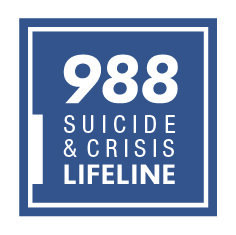Most people who attempt suicide do not die — unless they use a gun. If you
think a preteen or teen is depressed or suicidal, don’t wait to help.
-
Be direct and ask if they have thought about suicide. Asking about suicide
will not put the idea in their head.
-
If they say they have thought about suicide or you think they have thought
about it, get help right away and don’t leave them alone. If you’re not
the parent or caregiver, tell them. Or, tell the school counselor, a
mental health professional or call the crisis line at 988. Do
not keep it a secret!
-
If you’re the teen’s caregiver, temporarily remove firearms from your home and when your teen goes to a friend’s home, ask if there is a firearm in their home and how it is stored.
Even if a teen is not thinking about suicide, some additional key steps you
can take to support them include: inviting an honest conversation, listening
and supporting them, and encouraging them to see a mental health professional
or a primary care physician. If you’re not the teen’s caregiver, tell their
parent or a trusted adult.
Teach your teen to follow these steps if they are concerned about someone
they know.



